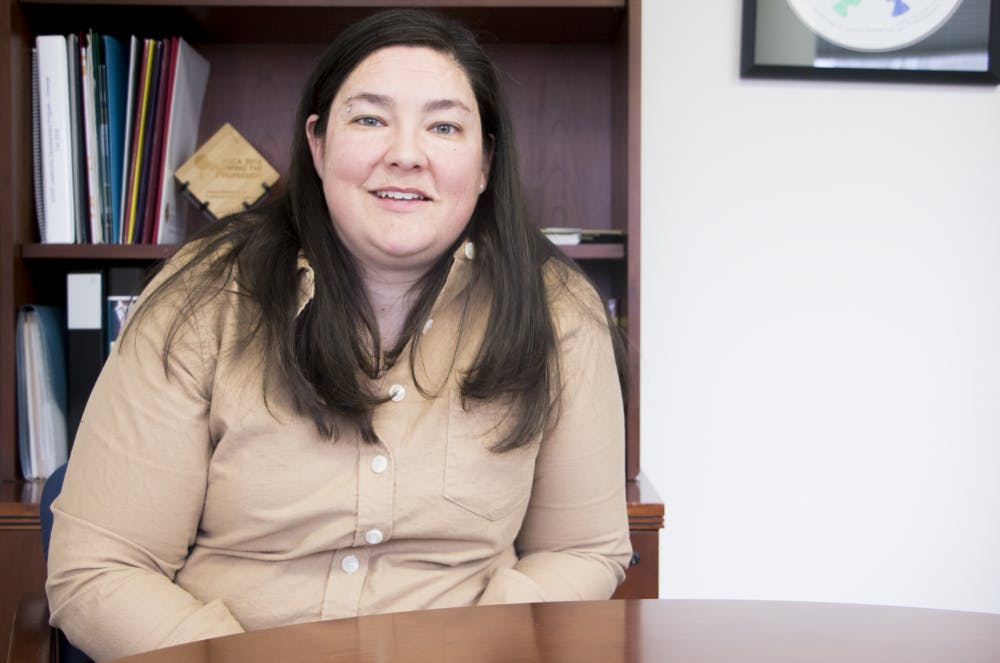This year, the University marked the first month of March in three years without a new Title IX complaint.
In March 2015, 2016 and 2017, the University announced that a complaint had been filed against them for their handling of a Title IX investigation.
Now, more than three years after the first complaint was publicized, there have been few updates on the state of the investigations from the Department of Education. However, the University has begun to address some of the issues expressed in the complaints.
A total of 314 sexual violence investigations are still open with the department’s Office for Civil Rights, including AU’s three complaints, according to the Department of Education’s new online database. A case can take up to seven years to resolve and on average takes about 2.1 years, The Chronicle of Higher Education reported.
Regina Curran, the University’s Title IX program officer, is unaware of the progress with any of the three cases. Curran’s start date was in May 2017 -- after the last of the complaints was filed.
“What we do know is that the department is speeding up,” Curran said. “They are issuing more outcomes than there used to be.”

The department announced in June 2017 that investigations would no longer require three years of data collection from each school targeted by the complaint. The complaints against AU predate the Trump administration, meaning the department has already collected data from AU. Curran said it is unclear whether they will still use all of that information when investigating the complaints or if they will use the new approach announced under Trump.
Faith Ferber, a 2017 graduate of AU, is one of the complainants accusing the University of violating Title IX by having her sign a non-disclosure agreement and not resolving her case in a timely manner, among other complaints, The Eagle reported in April 2016. At the time, the University said they enforced a “confidentiality policy,” which they have since changed to allow students to share their stories of abuse or assault.
Ferber filed her complaint in March 2016, leading to the opening of a Title IX investigation that year. As for the status of her case, Ferber is unaware of any developments.
“I have no updates and no idea when it will be resolved,” Ferber told The Eagle via email. “I have a feeling I won’t be hearing much from the Office [for] Civil Rights.”
A Department of Education spokesperson said the department could not give updates on the preexisting complaints against AU.
“As a policy, we don’t discuss the details of our ongoing investigations,” the spokesperson said by email.
The Department of Education previously provided a weekly update on the department’s Title IX investigations upon request. Their list, in addition to including open Title IX cases, also identified resolved cases. The new online format does not offer that information. Instead, a case is removed from their online list when it has been resolved, the spokesperson said. The list is updated on the first Wednesday of every month.
“This expanded list is an important tool for increasing public awareness about all open OCR investigations,” the spokesperson said in an email. “The Department emphasizes that an open investigation does not mean that an institution has violated federal antidiscrimination law(s); rather, it means that a complaint was filed with OCR and the agency has opened it for investigation.”
In the years since the first complaint was filed, the University’s Title IX office has made significant changes in the way it handles its cases. In the last year, they have hired Fariha Quasem to serve as the investigator in Title IX cases, and their hearing response protocol to Title IX complaints was replaced with an investigative model in August 2017.
Curran said previously, when an individual opened an investigation with the Title IX office, the process concluded with a conduct hearing to determine if the individual accused was responsible. Now, when an investigation is started, the investigator will determine whether or not someone is responsible, removing the hearing process. Once the findings are presented on the claim, if the accused is responsible, a panel will be convened to determine sanctions. If not, an appeal can be filed.
Katie Porras, AU’s director of student conduct and conflict resolution, told The Eagle in October that her office no longer requires both parties to be present for the hearing at the same time. In the past, students complained about the length of time a Title IX claim could take to be processed.
“We are looking at that as mitigating some of the timeliness [issues],” Porras said. “I think we’ll see that when they get into the process, the investigation is going to take less time.”
The process has also been streamlined so that individuals filing a case only need to make a decision to investigate their case once at the outset of the process, Porras said. Previously, those individuals would have had to make the decision to begin the investigation process and a second choice to begin the conduct hearing, she said.
“Now, the investigation is the process by which they get a finding of responsible or not responsible,” Porras said. “We’re taking out a decision-making point that we don’t need.”
Curran said the complaints with the Department of Education were only one factor in moving from a conduct model to an investigator model.
“So far, I would view the investigator model as successful,” Curran said. “The process seems less daunting. We have seen an increase in reports. I think we are better able to resource students through the process.”
Now that there are new protocol and staff in place to investigate Title IX claims at AU, Curran is working on expanding her role in the school community.
“I represent a portion of the change of the process here at AU,” Curran told The Eagle in October. “Now that we can have someone dedicated to the investigations, we can have someone who is really focused on the community’s role in preventing these issues.”
Jacob Wallace contributed reporting to this story.
This story was originally published in the April print edition of The Eagle.





